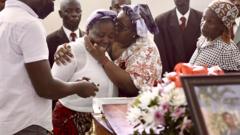Antonio Juaqim, a 16-year-old, was shot while participating in an opposition-led demonstration in Maputo, which was sparked by claims of electoral fraud after Frelimo's Daniel Chapo was declared the presidential winner with 71% of the vote. Mourners at Antonio's funeral were predominantly young, echoing the growing discontent among the youth regarding the ruling party's long-standing grip on power since independence 49 years ago.
The protests began on November 15, pushing citizens to bang pots and pans as a form of opposition against Frelimo's extended dominance. These nightly protests gathered momentum as attendees echoed demands for change, but they soon turned deadly, leading to a rising death toll including that of multiple children. Human Rights Watch estimates that at least 40 individuals have died so far in the protests.
As the mourning community gathered for Antonio's funeral, his family and friends expressed their grief over the relentless violence. "You were so full of life and hope. Now you are a victim of a bullet," a friend recounted during the eulogy, revealing the stark reality of growing fear in a country once celebrated for its peaceful transition to democracy.
Police officials have denied responsibility for the violence, instead accusing the opposition supporters of dangerous provocations. However, opposition leaders have criticized law enforcement for using excessive force against peaceful demonstrators. "It feels as though they are being used to protect the ruling party," argued Albino Forquilha, leader of a political party backing the opposition.
The brutal crackdown on dissent has raised alarms among young Mozambicans, who are demanding jobs and financial security over political allegiance. As violence continues, citizens are left questioning their future, hoping for justice amid an intensifying cycle of unrest in Mozambique’s political landscape.
The protests began on November 15, pushing citizens to bang pots and pans as a form of opposition against Frelimo's extended dominance. These nightly protests gathered momentum as attendees echoed demands for change, but they soon turned deadly, leading to a rising death toll including that of multiple children. Human Rights Watch estimates that at least 40 individuals have died so far in the protests.
As the mourning community gathered for Antonio's funeral, his family and friends expressed their grief over the relentless violence. "You were so full of life and hope. Now you are a victim of a bullet," a friend recounted during the eulogy, revealing the stark reality of growing fear in a country once celebrated for its peaceful transition to democracy.
Police officials have denied responsibility for the violence, instead accusing the opposition supporters of dangerous provocations. However, opposition leaders have criticized law enforcement for using excessive force against peaceful demonstrators. "It feels as though they are being used to protect the ruling party," argued Albino Forquilha, leader of a political party backing the opposition.
The brutal crackdown on dissent has raised alarms among young Mozambicans, who are demanding jobs and financial security over political allegiance. As violence continues, citizens are left questioning their future, hoping for justice amid an intensifying cycle of unrest in Mozambique’s political landscape.






















